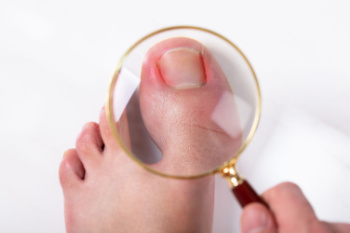
Ingrown toenails occur when the edges of the toenail grow into the surrounding skin, causing pain and discomfort. This condition typically affects the big toe but can occur on any toe. Symptoms of ingrown toenails include redness, swelling, and tenderness around the affected area, with the potential for infection if left untreated. The primary causes include improper nail trimming, where nails are cut too short or rounded, wearing tight or ill-fitting shoes that press on the toes, and having naturally curved toenails. Other contributing factors can include trauma to the toe or genetic predisposition. To prevent ingrown toenails, it is important to trim nails straight across and wear well-fitting shoes that provide ample space for the toes. If you have symptoms of an ingrown toenail, it is suggested that you consult a podiatrist who can offer you the treatment that is best for you, which may include minor surgery for removal.
Ingrown toenails may initially present themselves as a minor discomfort, but they may progress into an infection in the skin without proper treatment. For more information about ingrown toenails, contact one of our podiatrists of Family Foot and Ankle Care of Moriches. Our doctors can provide the care you need to keep you pain-free and on your feet.
Ingrown Toenails
Ingrown toenails are caused when the corner or side of a toenail grows into the soft flesh surrounding it. They often result in redness, swelling, pain, and in some cases, infection. This condition typically affects the big toe and may recur if it is not treated properly.
Causes
- Improper toenail trimming
- Genetics
- Improper shoe fitting
- Injury from pedicures or nail picking
- Abnormal gait
- Poor hygiene
You are more likely to develop an ingrown toenail if you are obese, have diabetes, arthritis, or have any fungal infection in your nails. Additionally, people who have foot or toe deformities are at a higher risk of developing an ingrown toenail.
Symptoms
Some symptoms of ingrown toenails are redness, swelling, and pain. In rare cases, there may be a yellowish drainage coming from the nail.
Treatment
Ignoring an ingrown toenail can have serious complications. Infections of the nail border can progress to a deeper soft-tissue infection, which can then turn into a bone infection. You should always speak with your podiatrist if you suspect you have an ingrown toenail, especially if you have diabetes or poor circulation.
If you have any questions, please feel free to contact our offices located in Moriches and Shirley, NY . We offer the newest diagnostic and treatment technologies for all your foot care needs.



